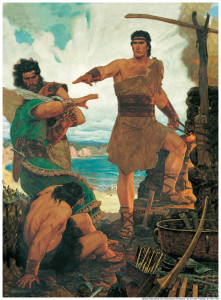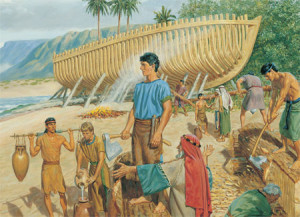I have been reading in 1 Nephi. As I have read and reread the chapters, over and over again, some themes have started to form in my head. Nephi seems to focus on key topics when it comes to making points about spiritual things to his spiritually reluctant older brothers.
Following are sample passages from 1 Nephi 17. On the surface, this chapter is about Nephi being commanded to build a boat. His brothers don’t want to help so Nephi reads them the riot act then the Lord shocks the two brothers to demonstrate His power.
That is the surface story. But underneath this tale is a wealth of doctrine (golden nuggets if you will) about the nature of God, His laws, faith, the Lord’s universal love and treatment of humanity, and more. All verses in this post come from 1 Nephi 17. Part 1 covers the first four golden nuggets. The remaining three will be covered in next week’s post.
-
God’s word is absolute
 Verse 3 begins with an absolute statement: “And thus we see that the commandments of God must be fulfilled.” Nephi is referring to the difficulties the family had in traveling through the wilderness. The Lord did not permit fire for the eight years they were in the wilderness, so they had to eat all their meat raw. The Lord made their meat “sweet.”
Verse 3 begins with an absolute statement: “And thus we see that the commandments of God must be fulfilled.” Nephi is referring to the difficulties the family had in traveling through the wilderness. The Lord did not permit fire for the eight years they were in the wilderness, so they had to eat all their meat raw. The Lord made their meat “sweet.”
Nephi is talking about the commandments of the Lord and that many of them were difficult to keep. The Lord provided them, like the Israelites being led out of Egypt, with miracles that allowed them to be successful in keeping His commandments. These miracles included the ability to live off raw meat for almost a decade, being led by the Liahona, and the women being made strong enough that they were able to amply feed their young, and the women become as strong as the men so they could toil in walking through the desert even while being big with child.
Consider this – the only thing in the universe to ignore a commandment of the Lord is one of His children. If the Lord commands a galaxy or star to move, it does as it is commanded. If the Lord commands the elements of the earth, they obey immediately. That is why Jesus could calm the storms, walk on water, and heal the sick. All elements obey the voice of the master. Only the master’s children dare countermand Him.
3. And thus we see that the commandments of God must be fulfilled. And if it so be that the children of men keep the commandments of God he doth nourish them, and strengthen them, and provide means whereby they can accomplish the thing which he has commanded them; wherefore, he did provide means for us while we did sojourn in the wilderness.
The Lord has told us that “men are that they might have joy” (2 Nephi 2:25). Each time we obey one of the commandments, the reward for our obedience is some form of blessing from our Father. Nephi acknowledges this in multiple places in his writings by saying over and over again that those who keep the commandments will have doors opened to them that will enable them to do what the Lord has told them they need to do. As long as we exercise faith in God by keeping His commandments the Lord will prove to us that we can accomplish anything He sends us to do.
For some reason this is a very simple concept to Nephi, but a very difficult one for Laman and Lemuel. Nephi and Sam accepted this principle at face value and proved it over and over again. Laman and Lemuel refused to believe the Lord’s promises. It is this refusal to believe, even in the face of overwhelming evidence that earns them the rebuke from Nephi of being hardhearted.
-
God tests our faith in steps
 In 1 Nephi 17:8 – 9, between verse eight and verse nine the Lord has revealed many things to Nephi, including showing him the blue prints for the ship Nephi was to build. In Nephi’s mind, with his commandment to go and build the ship that was now firmly fixed in his mind, all he needed was to be told where to find the needed ore, and he would figure out how to make the required instruments to make the ship according to the specifications of the Lord.
In 1 Nephi 17:8 – 9, between verse eight and verse nine the Lord has revealed many things to Nephi, including showing him the blue prints for the ship Nephi was to build. In Nephi’s mind, with his commandment to go and build the ship that was now firmly fixed in his mind, all he needed was to be told where to find the needed ore, and he would figure out how to make the required instruments to make the ship according to the specifications of the Lord.
8. And it came to pass that the Lord spake unto me, saying: Thou shalt construct a ship, after the manner which I shall show thee, that I may carry thy people across these waters.
9. And I said: Lord, whither shall I go that I may find ore to molten, that I may make tools to construct the ship after the manner which thou hast shown unto me?
Nephi had been prepared for this task, in part, by the sons’ two trips back to Jerusalem to get the plates from Laban, and again to convince Ishmael to bring his family down into the wilderness. Nephi records simple revelations and communications with the Spirit before going to Jerusalem for the plates of Laban, but once he was successful in passing this trial of his faith, despite enormous opposition both from Laban and from two of his older brothers, his revelations became far more expansive and detailed.
After he had proven faithful to the Lord he was shown the future of his own posterity, as well as the fate of all those who would live on the American continent for thousands of years to come. Now the Lord says to build a boat. After all these things he had experienced, why couldn’t he build a boat? Compared to other things he had seen the Lord accomplish, and the visions of the Lord’s accomplishments in the future, how hard could it be to build a boat?
-
The Lord always vindicates Himself
More often than not, the Lord requires us to do things without a full explanation of why we are being told to do it. It is a test of faith. (That is why we are here, remember?) What we sometimes forget is that at some point the Lord will always prove to us that we didn’t follow His commandments for nothing. He will always show us that we were doing the right thing, the wise thing.
In verses 13, and 14 we are told that if Nephi’s family will keep the commandments, the Lord will prepare a way for them to accomplish this great feat he has assigned to them. His promise is followed by another promise that at some point they will know that it was God, and not just Lehi, who led them out of Jerusalem at the right time. He will also prove to them that it was because of Him that they were saved from destruction.
13. And I will also be your light in the wilderness; and I will prepare the way before you, if it so be that ye shall keep my commandments; wherefore, inasmuch as ye shall keep my commandments ye shall be led towards the promised land; and ye shall know that it is by me that ye are led.
14. Yea, and the Lord said also that: After ye have arrived in the promised land, ye shall know that I, the Lord, am God; and that I, the Lord, did deliver you from destruction; yea, that I did bring you out of the land of Jerusalem.
How, you might ask, could the Lord prove to them that Jerusalem was destroyed and that everything He told Lehi and Nephi about what would happen to the Jews was correct? After all, they would be on a different continent. The answer came by revelation that Jerusalem had been destroyed. It would be 300-500 years later that the Nephites would run into the Mulekites, the descendants of the son of the king of Jerusalem, the only member of the royal family to have escaped the destruction and captivity in Babylon. This was their definitive physical proof that Jerusalem had been destroyed according to prophecy.
Note that I said that the Lord will always vindicate Himself. Sometimes it takes centuries or millennia before the proof is provided, but one way or the other, the proof that following the prophet is wise will always be supplied. The process is simple, we exercise our faith and choose to believe and act on what we have chosen to believe in, then at some point, after the trial of our faith, in the due time of the Lord (who knows all things), the proof that we were correct in believing will be provided. This principle that we receive no verification until after the trial of our faith is central to all we believe in the gospel. It is important to remember that God’s proof to me as an individual sometimes takes a backseat to the trial of faith of generations of people. The Lord will always vindicate himself, but I can’t expect it to come in my lifetime. (But I’m grateful when it does.)
-
Dealing with the hard of heart
Laman and Lemuel were not only unbelieving (deliberately so), but they were proud as well. To be hard of heart you have to have both an unbelieving disposition, as well as pride that places your will above God’s or anyone else’s. As you read 1 Nephi 17:19 – 22, see if you can identify what is missing in their stated position.
19. And now it came to pass that I, Nephi, was exceedingly sorrowful because of the hardness of their hearts; and now when they saw that I began to be sorrowful they were glad in their hearts, insomuch that they did rejoice over me, saying: We knew that ye could not construct a ship, for we knew that ye were lacking in judgment; wherefore, thou canst not accomplish so great a work.
20. And thou art like unto our father, led away by the foolish imaginations of his heart; yea, he hath led us out of the land of Jerusalem, and we have wandered in the wilderness for these many years; and our women have toiled, being big with child; and they have borne children in the wilderness and suffered all things, save it were death; and it would have been better that they had died before they came out of Jerusalem than to have suffered these afflictions.
21. Behold, these many years we have suffered in the wilderness, which time we might have enjoyed our possessions and the land of our inheritance; yea, and we might have been happy.
22. And we know that the people who were in the land of Jerusalem were a righteous people; for they kept the statutes and judgments of the Lord, and all his commandments, according to the law of Moses; wherefore, we know that they are a righteous people; and our father hath judged them, and hath led us away because we would hearken unto his words; yea, and our brother is like unto him. And after this manner of language did my brethren murmur and complain against us.
Did you find the omission in their argument? Laman and Lemuel completely left God out of the equation. The only time they came even close to mentioning Him was when they tried to argue that the Jews in Jerusalem were living the Law of Moses, so therefore they must be righteous.
Without the Lord in this story they would have a point. Without the Lord their delusional father, whom society demanded they obey, led them on a snipe hunt (a pointless task) and basically ruined their lives. Because of their father’s dreams all of their riches were lost, their home was abandoned, and their friends left forever. They had been robbed of their source of happiness. To help them out, Nephi reminds them of the part they left out of their narrative, the Lord.
45. Ye are swift to do iniquity but slow to remember the Lord your God. Ye have seen an angel, and he spake unto you; yea, ye have heard his voice from time to time; and he hath spoken unto you in a still small voice, but ye were past feeling, that ye could not feel his words; wherefore, he has spoken unto you like unto the voice of thunder, which did cause the earth to shake as if it were to divide asunder.
This is an important lesson for us to liken unto ourselves. How often do we feel like complaining because awful things have happened, yet we don’t take into account all the things the Lord has done to try to help us find happiness at the same time? Laman and Lemuel actually heard the voice of the Lord on multiple occasions. The Lord tried to speak softly, but because of their unbelief He had to do a little shouting to get their attention. They had actually seen an angel, and had to suffer through a scolding by him.
How often have we ignored all the spiritual promptings, the “coincidences” that could have helped us, the answers to prayers that we didn’t want to listen to, etc? Sometimes we are so upset that things are not feeling fair or are not going the way we want things to go, we become angry at the Lord and stop listening and trying to understand His will. At that point we have hardened our hearts and the Spirit can’t get in to teach us anything. Only something extreme will get our attention at this point. Let’s hope our bouts with being hardhearted are short and few.
Final Thoughts

To read more of Kelly Merrill’s articles, click here.
I love to study Nephi’s sermons. He sees the gospel as one great whole that all needs to be understood together. He teaches this way, bringing in principles from various sources to make his points.
As you begin to study the Book of Mormon, watch for these references that tie the gospel into one great whole. The Lord loves all his children equally, but it is we who defy Him and cause ourselves grief. The Lord does not need to exercise patience with the elements of the universe because they all obey His will. It is His children who cause Him the most sorrow, but also provide the greatest moments of victory as we learn to trust and obey Him.
Click here to hear Kelly read 1 Nephi 17 part 1
About Kelly P. Merrill
Kelly Merrill is semi retired and writes for https://gospelstudy.us. He lives with his wife in Idaho. His strength is being able to take difficult to understand subjects and break them down into understandable parts. He delights in writing about the gospel of Christ. Writing about the gospel is his personal missionary work to the members of the Church and to those of other faiths who are wanting to know more about Christ's gospel and His Church.






